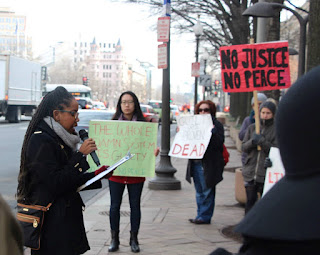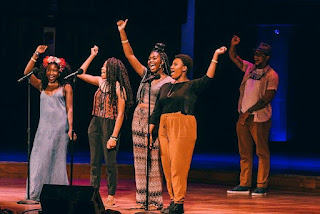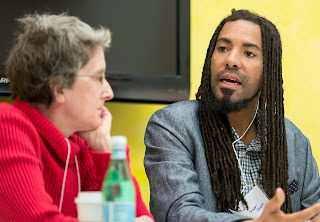Split This Rock's Program and Administrative Associate Tiana Trutna recently interviewed Sheila Black, judge for the 2017 Split This Rock Annual Poetry Contest. In the exchange, the two cover topics such as disability, intersectionality, what Sheila looks for in a poem, and joy. We invite you to get to know Sheila Black and be sure to send in your poems for the Annual Poetry Contest by November 1.
ABOUT SHEILA BLACK
 Sheila Black is the author of House of Bone, Love/Iraq (both CW Press), Wen Kroy (Dream Horse Press), and Iron, Ardent, forthcoming from Educe Press in 2017. She is a co-editor with Jennifer Bartlett and Michael Northen of Beauty is a Verb: The New Poetry of Disability (Cinco Puntos Press), named a 2012 Notable Book for Adults by the American Library Association. A 2012 Witter Bynner Fellow, selected by Philip Levine, she lives in San Antonio, Texas where she directs Gemini Ink, a literary arts center.
Sheila Black is the author of House of Bone, Love/Iraq (both CW Press), Wen Kroy (Dream Horse Press), and Iron, Ardent, forthcoming from Educe Press in 2017. She is a co-editor with Jennifer Bartlett and Michael Northen of Beauty is a Verb: The New Poetry of Disability (Cinco Puntos Press), named a 2012 Notable Book for Adults by the American Library Association. A 2012 Witter Bynner Fellow, selected by Philip Levine, she lives in San Antonio, Texas where she directs Gemini Ink, a literary arts center.
THE INTERVIEW
You co-edited the phenomenal Beauty is a Verb, The New Poetry of
Disability with Jennifer Bartlett and Michael Northen. What surprised you
the most about this anthology’s impact?
I think
what surprised me most was the fact that BIAV (Beauty is a Verb, The New Poetry
of Disability) even came into existence and then that it was noticed. I should
explain—at the time Jen and I and Mike began this, we had nothing more than a
glimmer of an idea behind us. None of us
had jobs in academia or many publishing contacts at that point. I had just left
the university where I’d been an adjunct and then a contract instructor for
many years, and had no job, and no clear sense of job direction. Jen was trying
to eke out a living as a poet and adjunct instructor, and Mike had just retired
from his work as educational coordinator for Inglis House, a facility that
serves people with disabilities in Philadelphia. In a way, our lack of
sustained employment was good, because we devoted ourselves entirely and
wholeheartedly to putting together Beauty
is a Verb. But to be honest I think we had very modest expectations of what
would become of it. We imagined years of
sending the book to small presses—some sort of small quiet publication—and just
the satisfaction we’d done good work.
What
actually happened was a little more miraculous. On New Year’s Eve, when we’d
been working on the project for about nine months, I went to a New Year’s Eve
Party and happened to be seated next to Bobby Byrd, poet and publisher of Cinco
Puntos Press. He asked me what I’d been
up to. I told him—and I must have sounded excited, because he asked to see the
manuscript. I sent it to him New Year’s Day. Two days later he called me and
said Cinco Puntos wanted to publish it. I suppose I am telling this story for
all the writers and thinkers out there with a project like ours in their minds—a
project born out of sheer faith, love. An amateur project, if you will. I think
BIAV taught me anyway that if you really go with what you believe, and you do
your very best to make the work strong, bigger things can happen than you
expect.
What makes you proud about the book’s
accomplishments?
I am proud
that Beauty is a Verb helped move non-disability communities away
from a purely tragic conception of
disability, or disability as simply a condition of being “less than.” I’m glad
we were able to trace through the wonderful writers who contributed some of
ways in which disability is a socially constructed phenomenon and how that
construction occurs. And—I have to
add—it still shocks me how dominant the idea of being “less than”: is—not only
for people with disabilities, but for communities of color, communities of
immigrants, LGTBQIA communities. We know it is wrong, but even so that idea
persists and gets reproduced. I’m proud that BIAV is one of the many books of
poetry, cultural artifacts we are seeing now that are exposing that idea for
the fraudulent construct it is.
You’ve said in past interviews that while editing the anthology, Beauty is a Verb, The New Poetry of Disability your ideas about disability expanded. Could you share a bit about that?
By
expanded my ideas of disability I think I meant I did not fully appreciate the
creative aspects of most disability experiences—by that I mean the multiple
ways in which alternative embodiment or what is often called “disordered
thinking” often lead to experiences and insights that simply wouldn’t be
available otherwise. To give some specifics—the way Larry Eigner describes
space from the perspective of one who
does not move freely within it; what ASL brings to the language of a poet like
John Lee Clark—a kind of filmic quality or way of charting action; or how C.S.
Giscombe conceives of transportation systems or “settling land” in a completely
unique way that arises both out of his experience as an African-American man
and a person with a disability; what Norma Coles’ work post-stroke tell us
about the relationship between the word and what lies before the word. I became
more appreciative of everyone’s—and I really do mean everyone’s—possession of a
unique set of experiential information that can add to the body of all our
knowledge; I think empathy, when it is really empathy, is less sympathy or pity
than a bare recognition of that fact—realizing that expanded my sense of value
and made me question the hierarchies, I had always lived within, which in most
cases were historically established. What was it Elizabeth Bishop said in “To
the Fishouses?”—“our knowledge is historical, flowing and flown.” When I was
editing Beauty is a Verb I thought a
lot about history—both as resource and burden.
You’re helping to launch a new
literary organization for poets with disabilities called Zoeglassia. Can you
tell us more about the organization and its aspirations?
Zoeglossia is an idea still, but soon to be implemented. I
am very excited about it. The founders, Jennifer Bartlett, Connie Voisine and I
were very indebted to forbearers like Canto Mundo, Kundiman, Cave Canem, and
Lambda Literary—organizations that pioneered the idea of creating open spaces
and supportive communities for African American, Asian-American, Latino, and LGTB
poets. We were talking about these organizations, and how important they had
been, and started to think that writers with disabilities really needed a
similar space. In fact, this need seemed particularly urgent to us because
people with disabilities are often isolated—in pure economic terms they also
often don’t have significant resources to travel, to engage in mainstream
writers conferences, educational opportunities, etc.
The goal of Zoeglossia is to create an annual retreat that would involve professional development
of attendees by prominent, established writers with disabilities. This
would include writing workshops, lectures, panel discussions and literary
readings. The emerging writers will be selected competitively based on their
writing and their expenses at the retreat will be covered in order to
facilitate participation. Writers will attend the retreat three times over a
five-year period to attain the credential of “fellow.” While people with
disabilities are among the largest minority group in America, writers with
disabilities are vastly underrepresented in academia in general, and
specifically in publishing, creative writing programs and the organizations
that govern the field. We look to Zoeglossia to be an advocate for more
representation of people with disabilities, but also a space for nurturing
writers with disabilities to produce their own best works—a shared creative
community with all that this implies.
With Vilissa Thompson starting the #DisabilityTooWhite conversation on Twitter,
there’s been some critique lately about disability being portrayed as
overwhelmingly white in the media and disability community. How do you negotiate
your whiteness as a disabled person and what are your thoughts on
intersectionality?
Vilissa
Thompson is telling an important truth. I am not on Twitter—I am such a
technology Luddite—so I missed this when it first happened, but she is so
right. The media does portray disability as overwhelmingly white. It is also
true that within disability communities we have a long way to go in terms of
being fully multi-cultural in our organizations and movements. The sad irony is
that this is exactly not the experience of disability itself. One of the powers
of disability—if I can use such a word—is the way it cuts across differences of
race, class, and nation.
I was
stopped a little by the second part of this question…I tried to figure out why
I was having a hard time answering, and I realized it was the word “negotiate,”
which I perhaps wrongly tend to associate with business dealings or work
conflicts. I don’t know that
my whiteness is negotiable. What I mean by that is that it is the weight of
history…To be white in this country is to have a history of enforced
privilege—to have been part of a story that is terrible and raw and involves
genocide, and slavery, and colonization, and a pattern of oppression that has
not yet ended. I may long to disavow
that personally, but I really can’t, and I think—if I could be so bold—that to
“negotiate” it feels wrong to me. I am
not sure what to do about it, but it feels more like something I just have to
sit with, live with, mourn and try to address—but not in a way that is
controlling, because control, or the control implied for me by a word like
negotiation, feels all wrong for the scale of the thing. That historical weight
feels rather like something I should hold in the darkest silence of myself, try
to breathe through, and try to really contemplate hard. I guess I am trying to
say my personal negotiation feels a lot less important to me than being vulnerable
to it.
Intersectionality
seems to me the way we have to move to move forward, particularly as the tools,
especially the psychological modes of oppression, often function in remarkably
similar ways—no matter what group they are used against…I hope that the
movement toward greater justice for people with disabilities, people of color,
LGTB people leads to a different sense of social order, a different way to
understand and value our communities. A movement, in other words, that creates
an order that is not quite so much like our current one, which is a little more
like a pyramid scheme than I would like—a few lucky souls at the top and
everyone else struggling to rise. I don’t think it has to be that way, but the
alternatives are not easily arrived at. I think intersectionality, if
considered as a dialogue between, could be a real space for forging something
new. I try to push that in my work as an activist. In my writing, to be honest,
I hold myself much more tightly—I think the real work I do is simply to try to
tell the truth of my consciousness in as openhearted, vulnerable and ruthless
way I can.
A successful poet in your own right,
can you tell us more about your writing process?
Zadie Smith, who—as well as being a wonderful
novelist—writes for me are what are perhaps some of the best personal and
critical essays of our times, said something about writing or being a writer
that I loved. “Tell the truth through whichever veil comes to hand — but tell
it. Resign yourself to the lifelong sadness that comes from never being
satisfied.” That was from a list she made—a great list—of advice to
writers.
I think that is pretty much my writing
process. I try to tell the truth. I resign myself to being disappointed,
because of course to convey the truth you can’t simply tell it, you have to eke
it out of yourself through all kinds of indirection and necessary discretion,
tempered, I think, by a willingness to be ruthless, and mostly with yourself,
which involves a lot of failure—moments when you don’t get it right or just
aren’t up to the task.
I still find the production of a poem
mysterious. I draft quickly and write a lot of drafts very quickly, but I
revise very slowly. I have friends who are the other way around, but whichever
way you choose, I think you have to work hard in the end. I also read a lot
because nothing inspires me to want to write more than someone else’s beautiful
poem. Yet that only helps to some degree,
because to be good—though you never entirely know if you are good—you
have to be willing to listen and nurture that small stubborn self that knows
something—what? That’s the hard part, pinning down that “what” that no one else
knows.
As Split This Rock’s 10th Annual
Poetry Contest Judge, tell us what you look for in a poem.
What I look for in a poem?
I have no idea until I find it. I like to be surprised. I like writers
who weigh words in their own unique way. I think the work of a poet happens in
much the same way as pearls are said to be made—something irritates or upsets
you, or you just don’t understand it, and you spend a long time playing words,
language until you find a way to get at that thing, maybe in part by
suppressing it or not directly stating it, or only expressing it, in a way that
also transforms it into an experience that contains something ineffable, a sense
of the mystery of being. I like works that reframe ideas or experiences for me
in ways that make me reconsider or renter that experience. I like poets who are
vulnerable and also in complete authority. I like to hear a voice, a particular
voice in a poem. Maybe that’s what I like most of all, the sense of a voice
speaking as if through me in a way I have never heard something spoken before.
Outside of the world of poetry,
what brings you joy?
I think
writing a good poem—rare as a butterfly on your hand—well, that is still one of
my great joys. My others—in no particular order:
- I like to go sit in a dark bar with
a good friend and one delicious cocktail
- I like to cook. I read once that
Hanif Kureishi (the author of “My Beautiful Laundrette”) complained in his
divorce from his second or third wife that she read cookbooks in bed, and I
thought, “But that’s me, I read cookbooks in bed!” Reading cookbooks in bed
makes me happy.
- I like to go to movies alone in the
middle of the afternoon.
- I like to read.
- I like to hang out in the kitchen
with my children.
- I like to go to museums and look at
one painting for half an hour and then leave.
- I like to travel almost
anywhere. I think most, if not all, of
the happiest times of my life have been when I was on the road or in a motel or
hotel room or a borrowed house in a city I didn’t know.
All
these things do give me joy—even if it is sometimes a slightly melancholic
joy.
What would you
like to be known for and how would you like to be described?
I am
fifty-five, and I am feeling that pressure of age—a pressure to know who I am
and what I’m about, which I don’t entirely, except, maybe I would like to be
more fun as I go on. I’d love to be described one day as a wild and reckless old woman, who people
visit just because she is good fun—someone capable of joy. That and a good
friend, a decent mother, an activist, a poet who tries,
All things
considered that is probably more than enough.
 Poetry will continue to be an essential voice of resistance in the years ahead. Poets will speak out in solidarity, united against hatred, systemic oppression, and violence and for justice, beauty, and community.
Poetry will continue to be an essential voice of resistance in the years ahead. Poets will speak out in solidarity, united against hatred, systemic oppression, and violence and for justice, beauty, and community.












